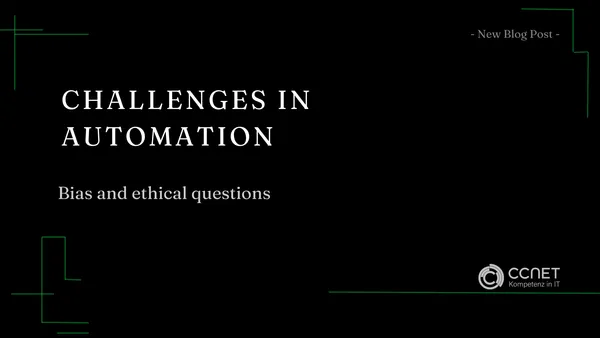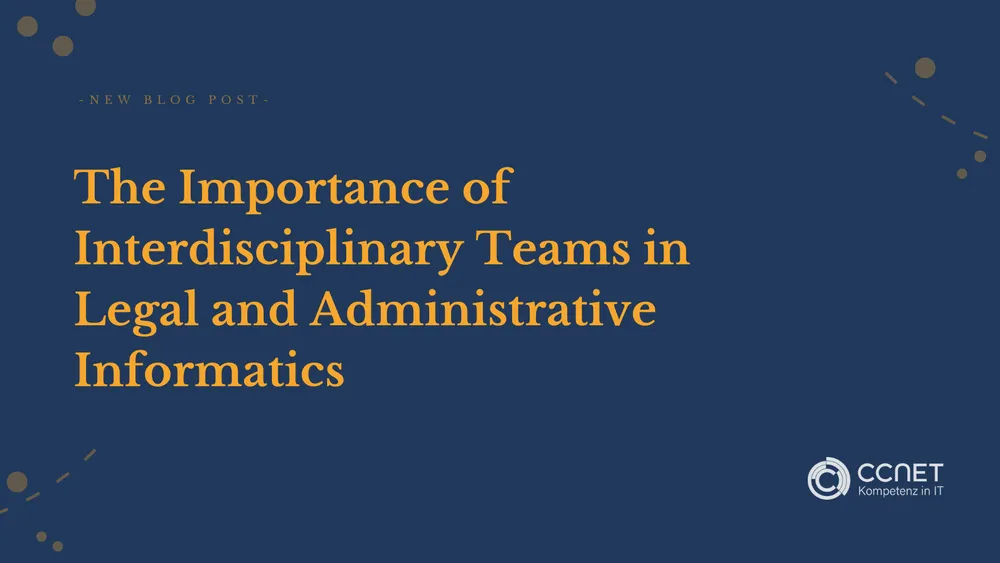
CCNet
Jul 8, 2024 • 3 min read

Challenges of Automation: Bias and Ethical Issues
Automation and the use of Artificial Intelligence (AI) in administrative action offer immense benefits, but they also bring significant challenges, particularly regarding bias and ethical issues. These problems must be thoroughly understood and addressed to ensure that technologies are used fairly and effectively. It is crucial that we include these aspects in the discourse on digital transformation of administration and develop appropriate solutions.
Bias in AI Systems
Bias or distortions in AI systems often arise during the training phase of the algorithms. They can be caused by unbalanced or insufficient training data that do not reflect the actual diversity or realities of a society. Such biases can lead to AI systems making discriminatory decisions that disadvantage certain groups. This becomes particularly problematic when these systems are used in critical areas such as public administration, where decisions can have significant impacts on people's lives. It is therefore crucial that AI developers are aware of this issue and continuously work to identify and correct these biases.
Ethical Considerations
The ethical implications of automation are far-reaching. Main concerns include the transparency of decision-making, accountability, and the impact of these technologies on the privacy and fundamental rights of citizens. Automated systems, especially those based on AI, are often "black-box" systems, whose workings and decision logic can be opaque to users and even developers. This poses a significant problem when it comes to the traceability and verifiability of decisions made by such systems. Developing more transparent and traceable AI systems is crucial for trust in their application.
Automation Bias and Human Oversight
Another critical issue is the so-called "Automation Bias" – the tendency to trust machine-generated decisions more than human judgment. This can lead to human decision-makers uncritically adopting AI suggestions, even if they are flawed. The need for a "Human in the Loop," a human oversight mechanism that ultimately reviews and is responsible for decisions, is therefore often proposed as a solution. Yet, this approach is not without its problems, as it can potentially dilute human accountability and limit the effectiveness of the technology.
Integration and Acceptance
To effectively address the challenges of automation, it is crucial that all stakeholders—from technology developers to end-users to regulatory authorities—are involved early in the development and implementation process. A "User-Centered Design" approach can help develop systems that are not only technically sophisticated but also socially acceptable and ethically justifiable, ensuring that the end-users' needs, preferences, and ethical considerations are meticulously integrated into the design process from inception to implementation.
Conclusion
Automation has the potential to significantly enhance efficiency and accuracy in many areas of both the public and private sectors. However, the associated ethical and social challenges must be taken seriously and addressed to ensure that these technologies are used for the benefit of all. Careful consideration must be given between the benefits of automation and the risks it entails, particularly concerning bias and the ethical integrity of decision-making processes.
How do you see the future of automation in your field? Do you believe the benefits outweigh the potential risks?
What is bias in AI systems and how does it arise?
Bias in AI systems often arises from unbalanced or insufficient training data that does not reflect the actual diversity or reality of a society. This can lead to AI systems making discriminatory decisions and disadvantaging certain groups.
What is "automation bias" and what are its effects?
Automation bias describes the tendency to trust machine-generated decisions more than human judgement. This can lead to human decision-makers uncritically accepting flawed AI suggestions.
What are the ethical challenges of automation?
Ethical concerns include the transparency of decision-making, accountability and the impact on citizens' privacy and fundamental rights. The traceability and verifiability of decisions is particularly problematic in AI-controlled "black box" systems.
How can the "human in the loop" help solve the problems of automation?
The "human in the loop" approach ensures that human control authorities review and take responsibility for decisions in order to minimise "automation bias". However, this approach can also dilute human responsibility and impair the efficiency of the technology.
How can acceptance of automation be promoted?
A user-centred design approach that involves all stakeholders early on in the development process can help to develop systems that are technically mature as well as socially acceptable and ethically justifiable.
What measures need to be taken to address the ethical challenges of automation?
It is important that both developers and regulators work continuously to identify and eliminate bias and develop more transparent, traceable AI systems in order to strengthen trust in the technology and decision-making processes.


